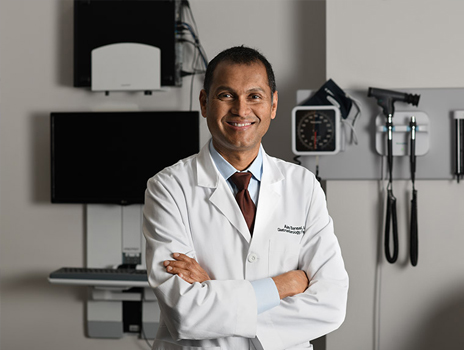- Home
- Research
- Research that Transforms
- Beyond the Bench
- Beyond the Bench 2022
- Researchers Study Vaccine to Prevent Lynch Syndrome-Related Cancers
Researchers Study Vaccine to Prevent Lynch Syndrome-Related Cancers

Lynch syndrome is an inherited condition that increases a person’s risk for developing many types of cancers. In fact, people with this disorder have as much as an 80% chance of developing colorectal cancer in their lifetime. It is estimated that one in every 280 Americans has Lynch syndrome.
Genetic testing can detect the condition. However, according to Ajay Bansal, MD, medical director of the Gastrointestinal Cancers Prevention Clinic at The University of Kansas Cancer Center, there are scarce prevention options for people with Lynch syndrome. To add to the current prevention methods that include frequent cancer screenings and risk-reducing surgery, Dr. Bansal recently launched a national clinical trial that will test a vaccine’s ability to potentially prevent cancer in Lynch syndrome patients.
The future of cancer prevention is harnessing the immune system. Dr. Ajay Bansal
Medical Director of the Gastrointestinal Cancers Prevention Clinic, The University of Kansas Cancer Center
A Team of Bodyguards
Vaccines work by imitating an infection and teaching your immune system to recognize and fight off future infections. According to Dr. Bansal, it’s like having a team of bodyguards working around-the-clock to ward off potential infections.
“With this study we are targeting an abnormal protein that resides on tumor cells. The goal is that after receiving the vaccine, trained immune cells detect and clear out the precancer cells expressing abnormal proteins before they develop into polyps or cancer,” he says. “The future of cancer prevention is harnessing the immune system.”
This is the first study to take place across all five cancer prevention networks under the National Cancer Institute’s Cancer Prevention Clinical Trials Network, a feat that has required extensive coordination and planning. Each consortium is comprised of several academic medical centers, where a team of experts work together to design and conduct early-phase cancer-prevention clinical trials. Team members started recruiting participants in September 2022.
“We have figured out how to work together efficiently so the next time a study comes along, we can move quickly,” Dr. Bansal says.